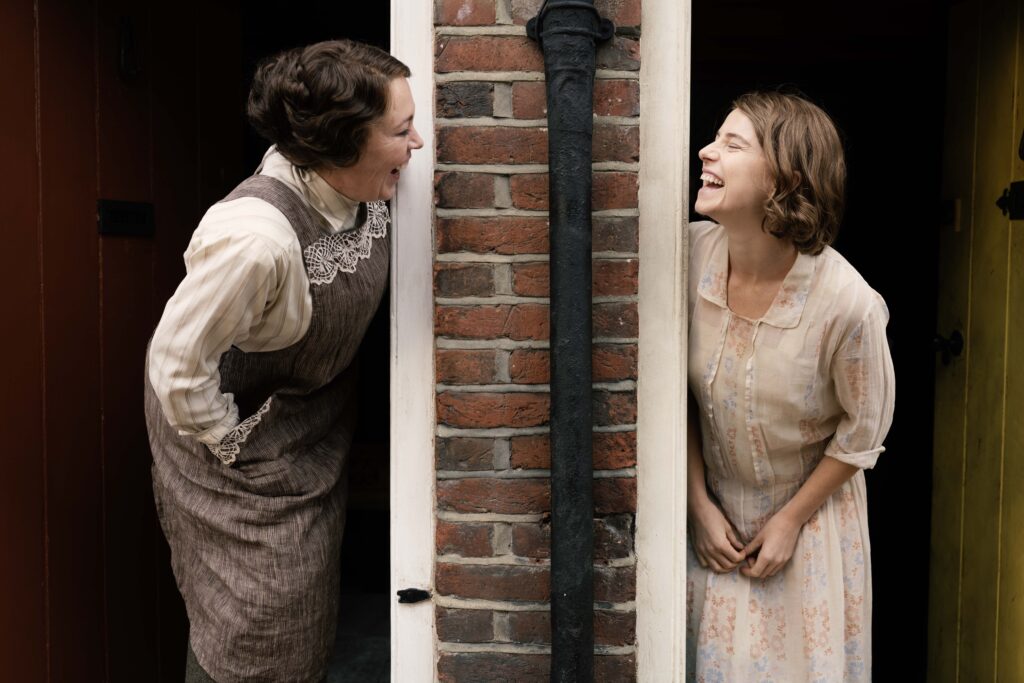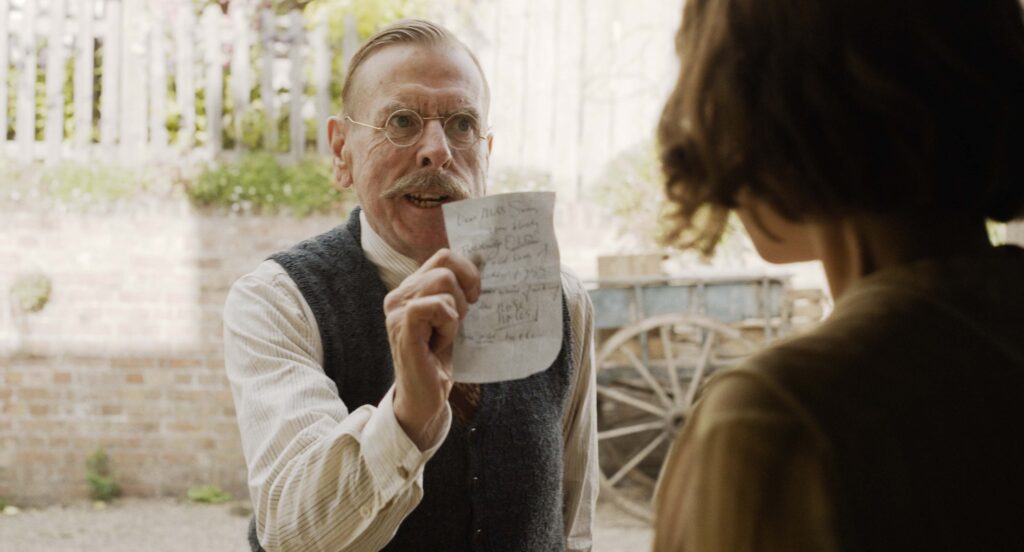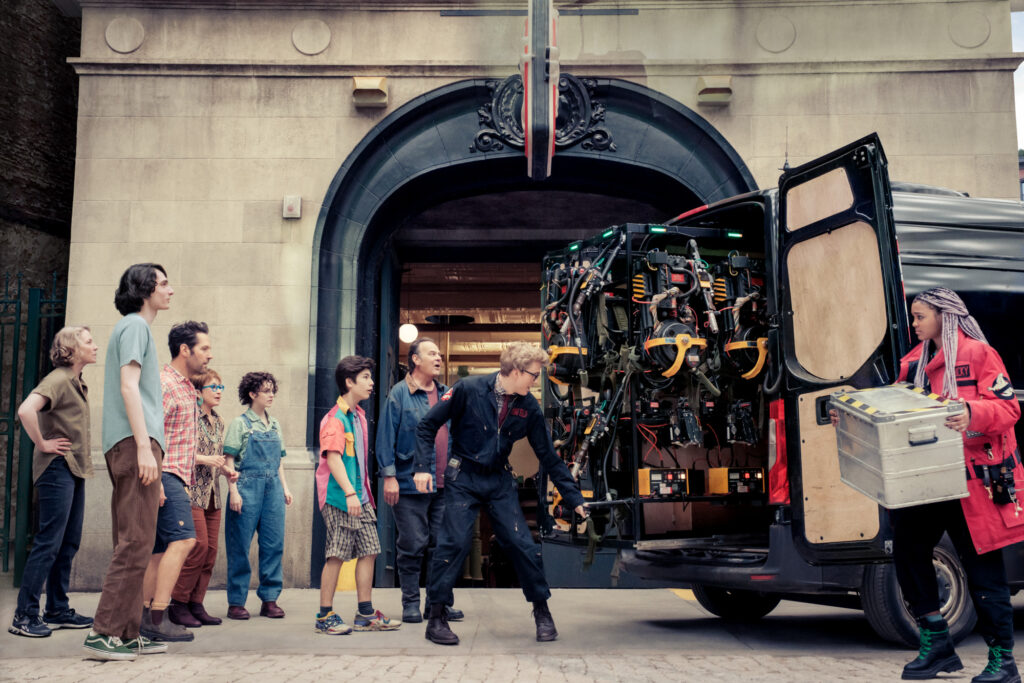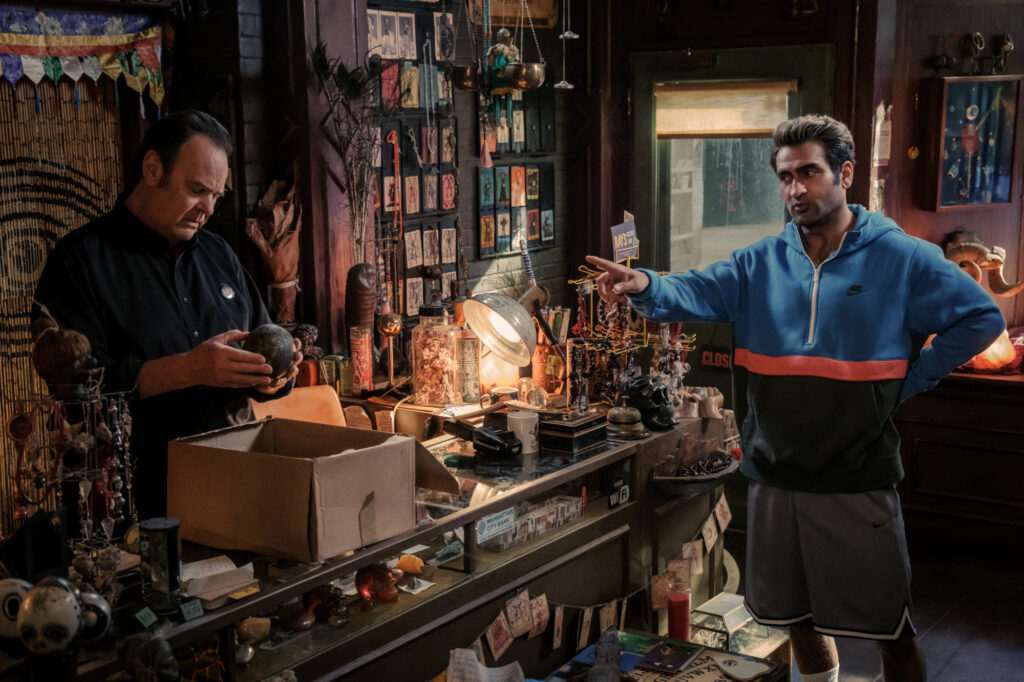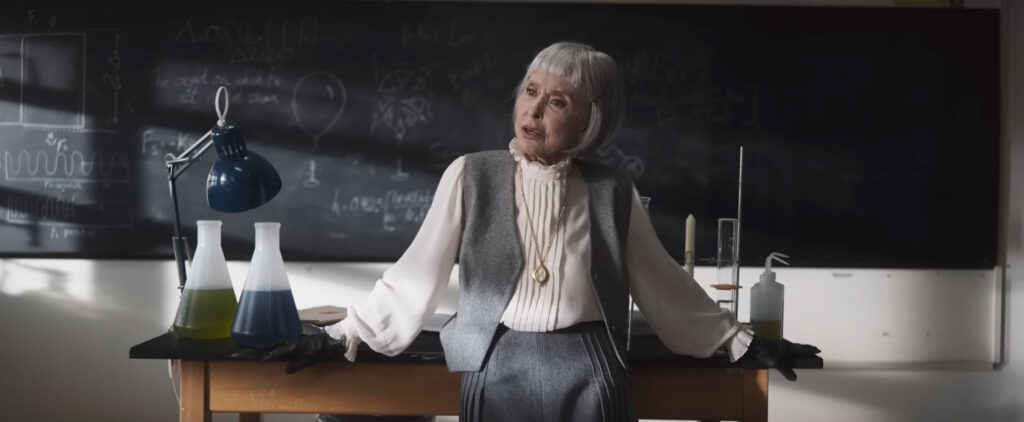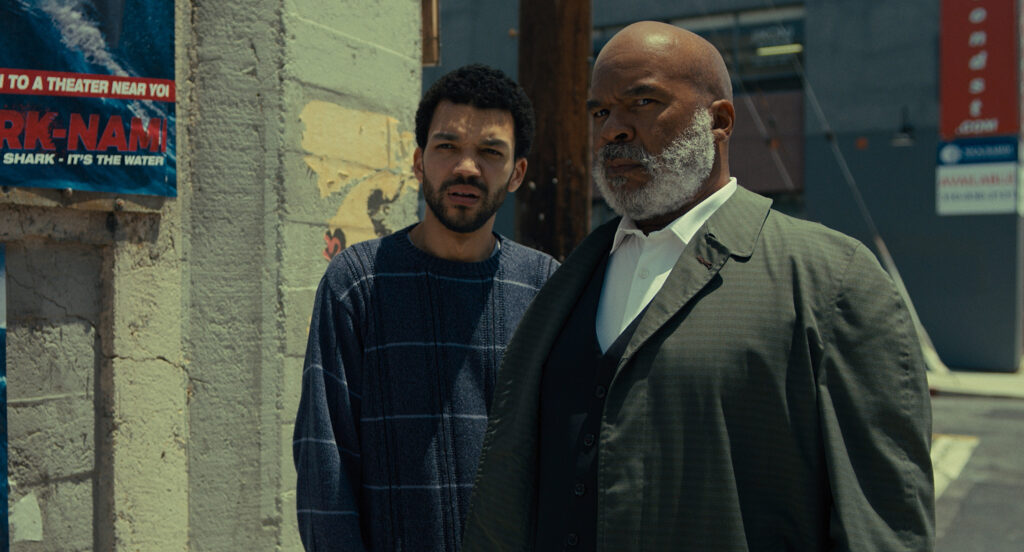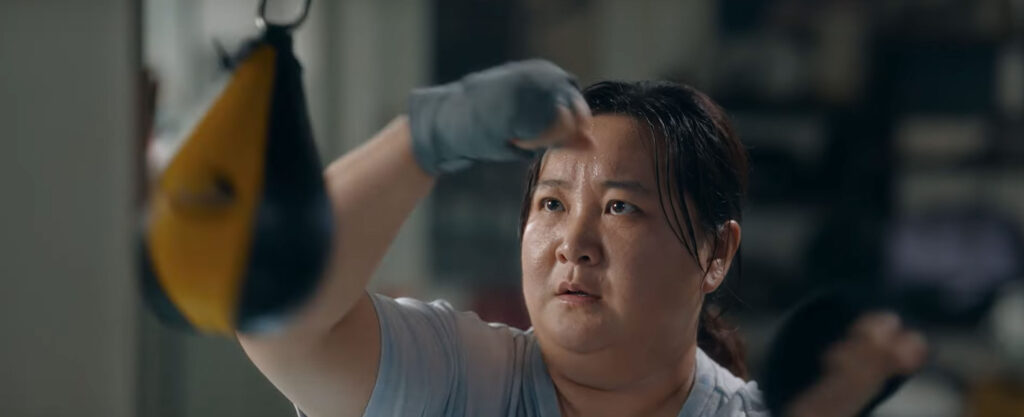April 7, 2024
by Carla Hay

Directed by Parasuram
Telugu with subtitles
Culture Representation: Taking place in Hyderabad, India, and in New York City, the comedy/drama film “The Family Star” features a predominantly Asian cast of characters (with some white people) representing the working-class, middle-class and wealthy.
Culture Clash: A workaholic architect, who is the main financial caretaker for his large family, physically beats people up in various circumstances and has a volatile relationship with a woman who becomes his tenant.
Culture Audience: “The Family Star” will appeal primarily to people who are fans of the movie’s headliners and stupid movies with egotistical main characters.
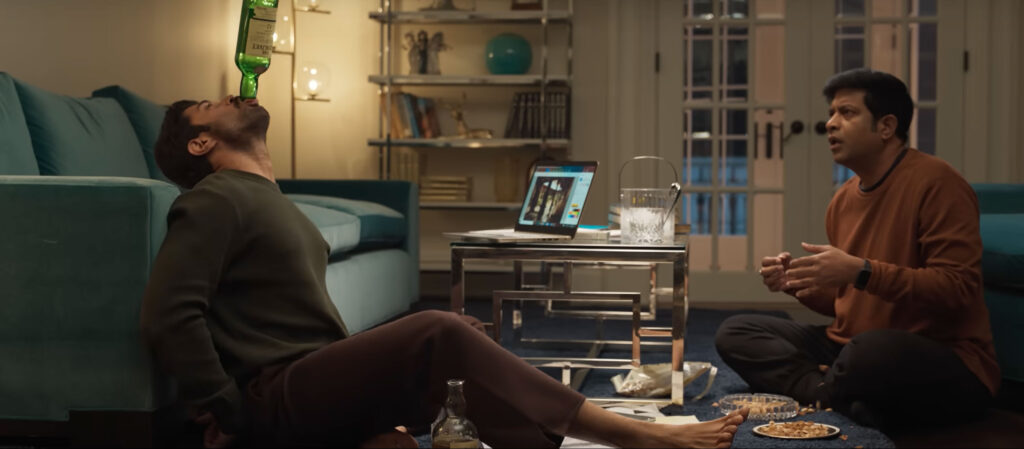
“The Family Star” is a disgusting glorification of toxic masculinity. This horrible movie excuses the arrogant protagonist’s physical abuse of his love interest. The film’s messy tone goes from melodrama in the first half to wretched comedy in the second half. “The Family Star” is a shameful and shoddy waste of time and has the putrid gall to literally describe the abusive main character as a “superhero” multiple times in the movie. It shows an appalling and warped attitude about what it means to be a decent and respectful human being.
Written and directed by Parasuram, “The Family Star” has a total runtime (about 159 minutes) that is as bloated as the protagonist’s ego. “The Family Star” has an unrelenting materialistic message that a man is a “hero” if he provides gifts and financial security to his loved ones. The problem is that the movie’s protagonist does a lot of things to show that he’s definitely not a hero: He physically beats up people in business deals. He cruelly slaps his love interest very hard in the face because she described him as financially struggling. He is obsessively controlling over who can spend money on his family. The movie’s fight scenes are over-the-top idiotic because the central character has superhuman strength with no explanation.
In “The Family Star,” the jerk who is grossly elevated to “superhero” status is Govardhan (played by Vijay Deverakonda), a 25-year-old bachelor architect who financially supports several family members who live with him in Hyderabad, India. The family members are his grandmother, his two older brothers, his brothers’ wives, his two nephews and three nieces. The children’s ages range from about 5 to 11 years old. Almost all of these relatives of Govardhan do not have names in the movie, which is the movie’s way of saying that Govardhan is the only family member who matters the most in this trashy story.
Govardhan’s grandmother (played by Rohini Hattangadi) tells Govardhan that he needs to get married so that he doesn’t have to carry the burden of taking care of his brothers’ families. One of Govardhan’s brothers (played by Ravi Prakash) is an unemployed alcoholic. The other brother (played by Raja Chembolu) has a struggling business and is heavily in debt. The brothers’ wives (played by Vasuki Anand and Abhinaya) are passive and mainly react to whatever Govardhan does.
It’s mentioned several times in the movie that whenever something needs fixing in the household, Govardhan takes care of everything. He also helps with grocery shopping and cooking. “The Family Star” keeps trying to make Govardhan look like he’s caring and responsible. And there are times he can be affectionate to his family members. But the reality is that he uses his “head of household” status as a way to manipulate and control his family and other people in his life. He also has a nasty temper and often verbally lashes out at people, including his family members.
Govardhan is obsessed with social class status and being upwardly mobile. He is middle-class, but he wants to be thought of as “upper middle-class.” Throughout “The Family Star,” it’s pretty clear that Govardhan is on an ego trip about being the family “breadwinner,” and he likes feeling superior to everyone in the household. Govardhan also likes to make his family members feel guilty that he’s their main source of financial support. He takes advantage of that guilt by acting like a dictator to his family. He also likes using his “breadwinner” position as a way to boost his public image, so that people can admire him for being such a “great” family man.
At Govardhan’s office job, an attractive female co-worker (played by Divyansha Kaushik), who’s about the same age as Govardhan, seems to be in love with Govardhan. She has proposed marriage to him several times, but he has rejected her proposals every time. (These marriage proposals are not shown in the movie, but they are mentioned in conversations.) Govardhan smugly tells her that he’s too caught up in his family’s problems and responsibilities to get married.
“The Family Star” is so stupid, there’s a scene early in the movie where Govardhan does a business pitch in a meeting for one of his ridiculous architectural designs. His design is a three-bedroom household that is only 600 square feet. Govardhan says that people who are psychologically happy with this small living space won’t complain. However, it’s obvious that the real size problem is Govardhan’s small mind.
Govardhan has a penthouse that he barely uses. This penthouse is next to the place where Govardhan lives with his family. The penthouse is being rented by a wealthy young woman named Indu (played by Mrunal Thakur), who is a graduate student at Central University. A flashback shows that before Indu rented the place, she was warned that Govardhan is very protective of his family and doesn’t want his family’s privacy to be disturbed. She decided to rent the place anyway.
Govardhan doesn’t really like a stranger living on his property. He has told his grandmother that he’s going to tell Indu to leave. However, Govardhan has been postponing this eviction conversation with Indu for two reasons: First, he doesn’t really want give up the rent money he’s getting from Indu, who makes sure that Govardhan sees that she carries large wads of cash. Second, Govardhan is infatuated with Indu, but he doesn’t want to admit it to anyone yet.
Govardhan is such a control freak, he tells Indu that she can’t buy delivery meals because the kids in the household will want the same meals when they see the meals being delivered. Govardhan orders Indu to only have meals that she can cook in her own home, or else she can go out somewhere else to eat instead. Indu tells Govardhan that if the kids request certain things to eat, there’s nothing wrong with agreeing to their requests. Govardhan strongly disagrees.
The real issue for Govardhan is that Indu has been trying to befriend the women and children in the household. She is kind to them and often gives them gifts. Govardhan is insecure and feels threatened that Indu (who has a lot more money than he does) will be more respected than he is by his family members.
One day, Indu treats the women and children to a party dinner at a shopping mall’s food court. They all have a good time. But when Govardhan finds out, he has a temper tantrum and orders his family members to stay away from Indu. Meanwhile, Indu sees and hears Govardhan go on this rant, and she feels insulted, but she eventually forgives Govardhan, and they start dating each other.
“The Family Star” is an annoying, tedious mishmash showing the ups and downs of the relationship between Govardhan and Indu. It’s a repetitive loop of Govardhan doing something wrong, Indu getting upset and distancing herself from him, and then she eventually goes back to him. It’s the movie’s terrible attempt to make a co-dependent, abusive relationship look romantic.
The scene where Govardhan slaps Indu on the face happens in front of several of her university colleagues. This slap was not done in self-defense. Govardhan slapped Indu because he was angry that Indu did an academic report where she truthfully described Govardhan as having financial problems. What makes the scene even more heinous is that no one says or does anything about this physical assault, which is a crime where the attacker should be held accountable. However, “The Family Star” makes this physical abuse look acceptable and eventually acts like the slap never even happened.
The movie’s not-funny-at all attempts at comedy, especially in the second half of the film, have no imagination and just regurgitate things that have been seen and done in so many other romantic comedies where a rich woman is being courted by a man who is not wealthy. In this part of the movie, Indu’s student lifestyle completely disappears and turns into something else that involves Indu’s business mogul father (played by Jagapathi Babu) and one of his hapless employees named Samarth (played by Vennela Kishore), who is ordered to spend time with Govardhan, for reasons that are explained in this garbage movie.
“Family Star” has a pathetic “battles of the sexes” storyline that’s phony and unappealing. All of the acting performances in “The Family Star” are mediocre or substandard. The musical numbers are unimpressive. Everything about “The Family Star” is creatively bankrupt, so it deserves to be the flop that it is.

